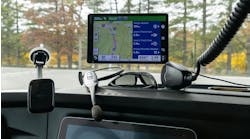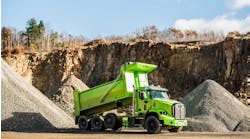CINCINNATI. It's not an official product or add-on service yet, but fleet management and telematics solutions provider BOLT System is developing a number of hands-free functions that could be available soon for fleet managers using its platform.
And the real point of the exercise, says Jerry Robertson, BOLT's chief technology officer, is that such an interface is likely "where trucking needs to go" in order to attract young talent — but also to help hang on to those industry veterans as long as possible.
The company showed off the interface at the National Private Truck Council's (NPTC) Annual Conference in Cincinnati this week. It works courtesy of Amazon's Echo two-way speaker/computer and Alexa assistant app: As an Internet-connected IoT device, the Echo pathway/Alexa has access to and can requisition a very broad universe of data. Within all that data, BOLT essentially has created and controls a specific "cul-de-sac" housing a number of recognized BOLT System voice commands and functions.
"You can teach a computer how to acquire knowledge — I hate to say 'artificial intelligence,'" Robertson told Fleet Owner during a demo of the Alexa-BOLT interface. "What we do well is data capture, data warehousing and data mining," he added, and this potential voice-activated interface simply executes the functions BOLT defines within its fleet management system.
At a glance, for the back-office fleet manager, being able to just talk at the computer and have it do what's needed for you could offer benefits like convenience, ease-of-use and simplicity. And for a truck driver, hands-free technology to interface with an in-cab terminal could mean less distraction as well as convenience and added efficiency, for example.
But Robertson thinks it could do more than that. For older truck drivers, learning how to use various functions of a fleet/transportation management system may seem a hassle — just one more new device to have to fiddle with and learn. A simplified voice-prompted system would allow them to just get in, start the truck and talk to the system for whatever they need to do.
On the flip side of that, says Gayle Robertson, Jerry's wife and president of BOLT, millennials and younger generations looking at something like being a truck driver want technology like this. "They want high-tech," she puts it simply. "This is what they will expect."
Adds Jerry Robertson: "It's actually got to go this way for them (i.e., millennials and younger generations) to look at this and say, 'I think I want to do this — I can have a career in this that lets me do what I'm interested in.'"
Among the commands BOLT has enabled with the voice-recognition app, users can ask the system — "Alexa, ask BOLT" — things like getting driver phone numbers, checking on any driver's available hours of service or locating specific trucks. That's just the beginning, because BOLT is planning to "turn the product loose" and let some select customers take it for a spin, so to speak.
"Knowing them, they'll come back to us and tell us what works well and what doesn't," Jerry Robertson says. "Most importantly, they will always come back and say, 'Well, can it do this?'
"We don't know what 'this' is right now, but then we'll go back and add those functions," he continues. "We'll build on them. And then when it does all those things they want to do, we'll come back and introduce a product."




